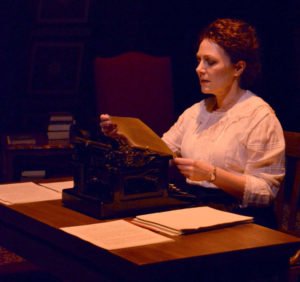Ghost-Writer: A Rare Experience in the Hurly Burly of 2017
by Michael Bigelow Dixon, director of Ghost-Writer
 We live in amplified times: the endless 24/7 news cycle, the infinity of social media, even Mother Nature is increasing her volume to 11. Exhausting, yes, but within this avalanche of events and commentary are voices of the people caught up in political intrigues, social justice movements, and humanitarian efforts—and their actions provide the defining stories of our age … or so it would seem.
We live in amplified times: the endless 24/7 news cycle, the infinity of social media, even Mother Nature is increasing her volume to 11. Exhausting, yes, but within this avalanche of events and commentary are voices of the people caught up in political intrigues, social justice movements, and humanitarian efforts—and their actions provide the defining stories of our age … or so it would seem.
There is another kind of story, though, that focuses on the internal life of people who find themselves grappling with questions of meaning, relationships, and actions that can’t be reduced to a headline or meme. Their struggles are filled with ambiguity, complexity, and mystery, and their stories are necessary for our times as well, because real progress results not from amplification—who can shout louder than anyone else—but from introspection, reflection and honest self-assessment that leads to actions consistent with values.

Michael Hollinger’s Ghost-Writer offers this second kind of story. Our protagonist, Myra Babbage, must come to terms with her creative powers as she completes a novel supposedly authored by a deceased novelist. Set in 1919, a year before women won the right to vote in the United States, Myra’s struggle embodies the politics of her time. Her personal crisis regarding creative agency is further complicated by love, loyalty, and a deep dedication to the art form of writing. As one might expect of a play in which a writer works in a room alone—along with ghosts and memories that inhabit the space—this is a quiet play, and the action of explaining her strange circumstance leads to her final breakthrough—or is it breakdown—or both?
Ghost-Writer celebrates the importance of a thoughtful inner life and the quiet that’s required to reflect and then move forward. Such an experience seems all too rare—and therefore all the more valuable—in the hurly-burly of life in 2017.




Leave a Reply